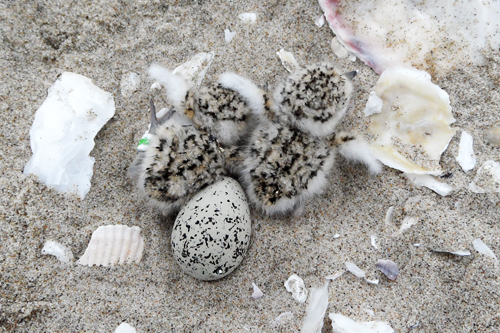The snowy plover lays its eggs right on the sand in Oregon’s coastal dunes. And thanks to building and development, its habitat is disappearing.
Threatened birds rescued by PSU researchers
The snowy plover lays its eggs right on the sand in Oregon’s coastal dunes. And thanks to building and development, its habitat is disappearing.

“The environment is changing, but they haven’t,” said Eleanor Gaines, zoology projects manager at the Institute for Natural Resources-Portland.
But, thanks to efforts by Portland State research assistants, two snowy plovers orphaned on an Oregon beach will have a better chance of surviving.
Two faculty research assistants from PSU were monitoring the life cycle of a group of the federally protected birds nesting at the Bandon State Natural Area under a contract with state and federal agencies. Because they are on the list of threatened birds under the Endangered Species Act, the researchers were tasked with monitoring specific nests and the birds and eggs in each one.
At one nest they were monitoring, however, disaster had struck.
“We checked the nest on the day the chicks were supposed to hatch, and we didn’t see the adults,” Gaines said.
An investigation of the nearby area revealed that the adults had been killed by a red fox, judging by the tracks in the sand. This left one chick and two eggs in the process of hatching without any parents to raise them.
They collected the chicks and called the Oregon Fish and Wildlife Service, who decided that they should go to the aquarium in Newport where they could be cared for, Gaines said.
Once at the Oregon Coast Aquarium, the hard work began to keep the chicks alive and adapted to the closest possible equivalent to their natural habitat.
“We’ve tried to limit human contact with them and simulate a natural habitat for them as much as we can,” said C.J. McCarty, the aquarium’s curator of birds.
Not all has gone as planned. One chick died in the process, further complicating the Western snowy plover population problem in the region. Despite many efforts to combat the loss of life among the species, the plover remains a threatened animal, especially given the loss of available habitat.
“If action isn’t taken they’ll move to an endangered species. The point of the endangered species list is to make sure that doesn’t happen,” Gaines said.
Gaines, McCarty and various environmentalist associations have worked hard in recent years to keep the plover population growing. The plover has seen a slow but gradual population increase over the decades, Gaines said, and McCarty’s care for the orphaned chicks has been relatively successful.
“In 20 years, their population has gone from 35 to 200 adults,” she said.
“When the chicks first arrived, they were at about five grams each. Now they’re at 25 grams. We’re waiting for them to finish replacing their down with juvenile feathers and to grow in their flight feathers, at which point we’ll plan on releasing them back near the beach,” McCarty said.
The Western snowy plover monitoring assignment is just one of many that the Institute for Natural Resources is currently involved with.
“We work with all elements of biodiversity. In kind of a long-running project, we’ve been doing a lot of landscaping work, some invasive species work, a lot of vegetation mapping, finding where different plant communities are in the area, doing some wetlands work, some work with rare invertebrates; we kind of cover the whole gamut,” Gaines said.
Their efforts have drawn praise from the community.
“I feel like the Institute for Natural Resources did a good job monitoring the birds because if they hadn’t found them they may not have survived,” said Kourtney Kuiper, a PSU biology graduate, former park ranger and current employee at the Oregon Zoo.
The chicks are on their way to recovery and should be released soon. Gaines believes that everyone can help the species survive and thrive.
“The main message we have for the public is to share the beach,” she said. “People can disturb birds during their nesting season; we just ask that people cooperate and help with obeying restrictions.”






